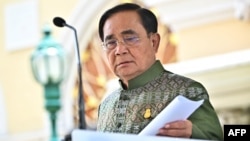Thai Prime Minister Prayuth Chan-ocha, the former army chief who has run Thailand since seizing power nine years ago in a coup, said Tuesday he is leaving politics.
The decision comes just days ahead of a crunch vote that will decide if the leader of the kingdom’s pro-democracy camp can become prime minister.
Prayuth, 69, toppled an elected government in 2014 — the 13th coup since the end of absolute monarchy in 1932 by a royalist army that has never allowed democracy to take root in Thailand.
Throughout, Prayuth described himself as a soldier forced to step into politics to protect the nation from instability. Reinventing himself as prime minister, the former soldier refused to stand down despite poor economic performance and massive pro-democracy protests.
Tuesday’s statement appeared to quash mounting rumors that Prayuth may try to stay on as prime minister despite his party’s poor performance in May 14 polls, whose results observers have described as a repudiation of the military government.
"From now, I quit politics by resigning as a member of the UTN party," he said in a statement posted on the United Thai Nation, or UTN, party's official Facebook page.
He will remain as caretaker premier until a new one is appointed.
Thai pro-democracy leader Pita Limjaroenrat, who aims to assume Prayuth’s office, faces a critical week in a bid to govern the country after his Move Forward Party (MFP) acquired 151 seats in the lower House in May.
Pita, 42, has been drawing large crowds in a nationwide post-election tour to drum up political support. His path is blocked, however, by a constitution written under the outgoing government, which says any new prime minister needs to claim an outright majority of the 750 votes from the combined two chambers in parliament.
In the upcoming July 13 vote, Pita’s Move Forward leads a lower House of Representatives coalition majority of 311 of 500 seats. The 250-member Senate, appointed by Prayuth specifically to give the army veto power in parliament, appears unlikely to support Pita, leaving him short of the 376 votes required to become prime minister.
“We’ve come way too far to lose now. Just a few more steps and we will reach the finish line together,” Pita told a rally in Bangkok on Sunday. “This finish line belongs to no one but the people … the upper and lower house together will decide what Thailand’s next decade or century looks like.”
The majority of senators are arch-royalists who reject calls to reform Thailand’s strict lese-majeste law, which protects the monarchy from being targeted by critics.
Scores of young pro-democracy protesters have been prosecuted under that law, which over the last two years has carried sentences of between three and 15 years in jail.
Pita also faces a legal threat from the Election Commission, which is probing whether he deliberately hid holdings of media shares in a now defunct company when he ran for office.
If the commission decides to push the case to the Constitutional Court, Pita could be suspended as a lawmaker and face a long ban from politics, and possibly jail.
The court has dissolved several pro-democracy parties in the last 20 years, including Move Foward’s predecessor, Future Forward.
“It is highly unlikely that Pita will receive enough support to be approved as the prime minister, primarily due to the military-appointed Senate,” said Napon Jatusripitak, a political scientist at the ISEAS Yusof Ishak Institute, a Southeast Asia research group based in Singapore.
That could mean Pheu Thai, Thailand’s former leading pro-democracy force, puts forward its own candidate for premier, who is widely expected to be real estate tycoon Srettha Thavisin.
But if Pheu Thai are also blocked by the Senate, the candidate of the ruling Phalang Pracharat party — former general Prawit Wongsuwon — could step into the frame, said Paul Chambers, a political analyst and lecturer at Thailand's Naresuan University.
“Since senators support him, he could well become the next PM,” Chambers said of Prawit, Prayuth’s number two.
“The consequence: enormous, angry, pro-MFP demonstrations.”
Thailand has experienced periodic rounds of street protests over the last two decades, often resulting in bloody unrest.
MFP’s “four D’s” campaign — Demilitarization, Democratization, Decentralization and Demonopolization of the economy — drew votes across the country as 14 million people rejected slumping freedoms and a sluggish grassroots economy under Prayuth’s government.
“People here just want a new government, new prime minister from the democracy camp,” said Abdulloh Sadeh, 25, who ran for parliament, representing his home area of Yala province near the Malaysia border in the May 14 election.
“I just want to see a government that is fully democratic,” he added. “Structural change is not going to happen overnight but when we have true democracy, real change will happen.”






